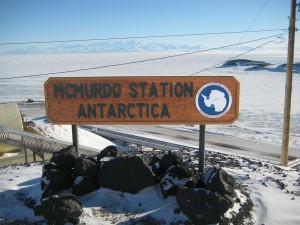 A photo of Jello Wrestling among fully clothed adults was published today as an indictment of the National Science Foundation (NSF) and its off-duty recreation program for McMurdo Station, Antarctica. Since I’ve spent a little time at McMurdo Station, I’d like to come to the defense of the NSF – by doing nothing more than describing what life in Antarctica is like.
A photo of Jello Wrestling among fully clothed adults was published today as an indictment of the National Science Foundation (NSF) and its off-duty recreation program for McMurdo Station, Antarctica. Since I’ve spent a little time at McMurdo Station, I’d like to come to the defense of the NSF – by doing nothing more than describing what life in Antarctica is like.
I am not, and have never been an employee of the National Science Foundation, and have never held an NSF grant. I’ve never participated in a Jello wrestling match, although it looks like fun. So, I am unbiased about this news event. However, I am informed about the rigors of daily life at McMurdo Station.
The following link is to a Washington Times article reporting on a supposed tally of $3 billion of financial excesses within the NSF. http://www.washingtontimes.com/news/2011/may/26/tax-dollars-shrimp-treadmills-jell-o-wrestling/
What is most concerning to me, is that the Coburn report focuses on a non-science activity, designed to relieve interminable boredom in a minimalistic environment. I think that, if pressed, the report’s author would have to admit the photo has nothing whatsoever to do with waste in science funding. How much can Jello bought in bulk for the McMurdo cafeteria cost?

As the Google image above shows, men and women who support the McMurdo and South Pole Station are isolated by vast distances from “civilization”. The closest cities with air transportation to the U.S. bases are either in Christchurch, New Zealand, or in Chile. During the winter, with 24 hours of darkness and generally horrible weather, it is virtually impossible for anyone to leave the bases. There are no flights into or out of the continent. So if anyone developes a medical problem or injury too great for the local medical support staff to handle, they are simply out of luck.
During the winter months, the size of support and scientific staff are greatly reduced, so those sharing the bleak winter together get to know each other, well. The contract staff during both winter and summer is composed largely of young, college-age men or women who are healthy, energetic, and are signing on for adventure.
But think about it. With 24 hours of darkness during the winter, the opportunities for recreation are minimal. It typically isn’t safe, or even possible, to go for walks or runs outdoors. A trip away from base, or even close by, could prove fatal if the weather were to change suddenly, which it often does. There are no soccer fields, no ball parks. And even worse, for those of you forever connected to the Internet, there is barely enough bandwidth down there to support email on a bank of shared computers. Want to send a photo of yourself home to the folks? Forget about it. At least that’s how it was when I was there a couple of years ago.

Life in Antarctica, at its best, is a spartan existence in a harsh, unforgiving environment. So how do these young men and women entertain themselves?
The fact of life is that off-duty entertainment, anywhere in the world, can lead to pregnancy, which in Antarctica can easily become a medical emergency. And medical emergencies can lead to drama very quickly since flights out of McMurdo are nonexistent in the winter and difficult to arrange, and very expensive, even during the summer. So group entertainment that keeps these young healthy adults occupied is a wonderful idea.
I admit I do not know all the facts behind the firing of the Jello Wrestling organizer, reported in various news accounts. But I have to wonder: why would off-duty entertainment be a reason to very publicly condemn the organization that funds and staffs the McMurdo Station, and funds a large proportion of science research in the U.S.? 

As a scientist I do not understand the denigration of the noble discipline that helped our country attain greatness, defend itself, and lead our way into the future. If science is to be attacked in public, I would ask that those attacking it be held accountable for the damage they do to science institutions, and to the minds of young men and women on the verge of becoming scientists. As a country we decry our failing leadership in science and engineering, and complain of the poor quality of education in the math and science disciplines, and yet we allow, and even fund, studies that criticise programs that have long been working safely and productively in the harshest environment on Earth.
The U.S. Antarctic Program is a success story, in spite of what headlines of the day might suggest.
I think Mr Coburn needs to understand what living in Antarctica is like. There has been many papers written about isolation and its effects. So go Jelo wrestlers go, keep enjoying yourself and releaving bordem.
I for one understand what you are doing, having spent around 5 years in Antarctica.